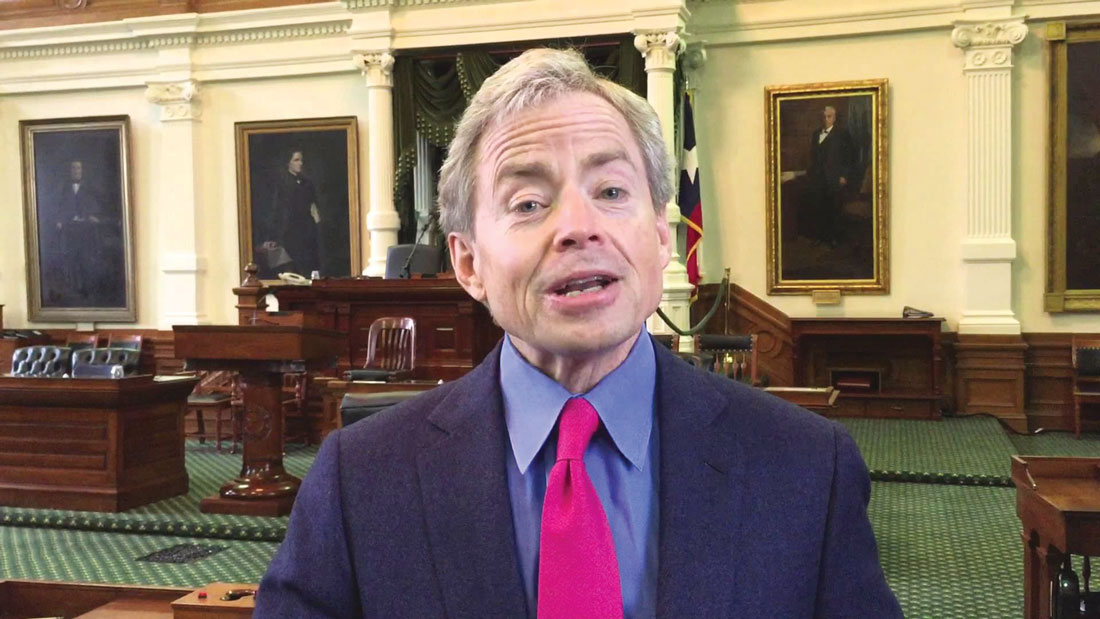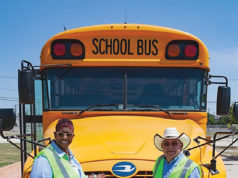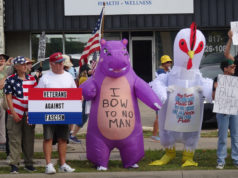If three bills making their way through the legislative process in Austin become law, home rule in Texas would effectively be gutted.
Identical House and Senate bills that would exempt the gas and oil industry from home rule ordinances are passing easily through their respective legislative branches. A third bill, one that would allow the state to create rules and regulations that could retroactively gut all city and municipality ordinances, is also in legislative play. Critics, who believe home rule is important because it allows local governments to craft laws specifically designed by and for the cities’ residents, have called the bills the biggest power grab in the state’s recent history and claim the wording of the bills came straight from the gas and oil industries.
“This is a fascist takeover of public interest by corporate interests,” said Lon Burnam, former long-time Fort Worth state house representative. “This has never been attempted in Texas prior to this.”
Sharon Wilson, outspoken critic of the gas industry and the Texas representative of Earthworks’ Oil and Gas Accountability Project, said the bills “are coming straight out of ALEC,” the American Legislative Exchange Council, a conservative organization that writes bills for state legislators that will benefit its members.
State Rep. Phil King, a Republican from Weatherford, is ALEC’s chairman and the author or co-author of several bills that would limit or eliminate local home rule authority. Among the bills that he has co-authored is HB40, which would turn all regulation of gas drilling, fracking, transportation, and storage over to the state-run Texas Railroad Commission, pre-empting more than 300 local gas-drilling ordinances in home rule cities and municipalities.
That bill, and its identically worded companion, SB1165, are seen as a response to the ban on new fracking in Denton. Passed in November 2014, Denton’s ban –– along with the 1,500-foot setbacks from inhabited buildings for drilling, enacted by local ordinance in Dallas and elsewhere –– could be eliminated by new rules put in place by the railroad commission, which oversees gas and oil drilling in Texas. Giving the commission unilateral power to develop rules and regulations regarding setback distances, the number of wells considered reasonable, and other gas and oil-related issues would dramatically change the balance of power that currently exists between home rule cities and gas and oil companies.
The bills appear to have the backing of both the legislature and governor’s office.
Both bills specify that “the authority of a municipality or other political subdivision to regulate a gas and oil operation is expressly pre-empted” unless those regulations are “commercially reasonable,” which the bills define as “a condition that permits a reasonably prudent operator to fully, effectively, and economically exploit, develop, produce, process, and transport oil and gas.”
Wilson is not amused.
“They talk about reasonable,” she said, “but what they mean is that every city in Texas will now be forced to allow gas drilling. If your ordinance doesn’t permit fracking, that’s not going to be considered reasonable. This is simply a way for corporations to push their gas and oil wants on cities with no consideration for the health and safety of the people who live in those cities.”
Home rule cities would still be permitted to pass or keep ordinances on noise levels, hours of drilling operations, and well pad landscaping, provided those things do not interfere with gas and oil drilling.
King did not return phone calls for this story.
Railroad commission spokesperson Ramona Nye suggested that as the bills are still in process, questions as to what sort of regulations might be implemented ought to be addressed to the lawmakers.
“Of course,” she added, “the railroad commission will carry out the will of the Texas Legislature on this issue.”
First-term State Sen. Don Huffines’ bill takes a broader swipe at home rule than either of the other two bills by allowing the state to override any and all city ordinances retroactively. Section B of SB343 reads, “Unless expressly authorized by state statute, a local government shall not implement an ordinance, rule, or regulation that conflicts with or is more stringent than a state statute or rule regardless of when the state statute or rule takes place.”
What makes the Dallas Republican’s bill so ominous, critics say, is its retroactivity.
“On first glance, you wonder why the bill is even needed,” said Carol Birch, an attorney with Public Citizen, a nonprofit organization that lobbies and litigates on behalf of the public interest in Washington, D.C., and Texas. “The bill is suspicious because state law already trumps local law if there are conflicts. The thing is, when the bill states, ‘Regardless of when the state statute or rule takes effect,’ you are certainly intending it to be retroactive.”
Birch, a former administrative law judge with the State Office of Administrative Hearings, said that wording would allow the bill to cover any local ordinance that the state wanted to remove.
“We call the Huffines bill the ‘super-pre-emption bill,’ ” said Bennett Sandlin, executive director of the Texas Municipal League, which represents member cities before state and federal legislatures on many local issues. “This bill sweeps all local ordinances in the state off the table. Right now, home rule cities regulate all kinds of areas that are not covered by state law, but this would strip those cities of home rule power.”
Sandlin sees the potential power grab as dangerous. “Cities have distance regulations from schools and playgrounds for sex offenders, for instance, but the state could wipe that out because they have a different rule. Austin’s ban on the use of plastic bags in supermarkets could [also] be tossed, along with a host of other ordinances.”
Among them, LBGT protections against employment discrimination in several large cities, including Fort Worth, Austin, Dallas, and Houston, could be eliminated. Local ordinances regarding paid sick days or the location of payday lenders or basic zoning regulations could be overruled by new state regulations.
“This is a very dangerous bill,” Sandlin said.
Huffines did not respond to requests to discuss the bill’s ramifications.
“Let’s face it,” Burnam said. “The Huffines bill is the work of overzealous right-wing nuts. It’s the last gasp of the dinosaurs to keep Texas from moving into the 21st century. The same people who screamed about local control over civil rights against the federal government want to do the same thing to local governments now. This is absolutely about taking away the rights of local people to run their own municipalities.”
Sharon Wilson agrees.
“These bills,” she said, “are about taking away local control so that corporations can do what they want with less regulation and control.”













Figure out who is behind these bills; follow the money if the path isn’t hidden and you quickly realize that this Legislature is bought. Unfortunately, this is happening all over our country and soon we will not be America.
what was it our dear leader said about governing? something about winning elections I think!
Did you vote in the mid-term? Well, did ya? I blame Democrats, Independents and disillusioned Republicans who did not bother to register or vote!
Our country and especially Texas has a poor voter turnout! Yes, I’m upset Democrats, Independents and disillusioned Republicans negated their responsibility to each other.
For the next two years Democrats, Independents and disillusioned Republicans are just as guilty for the ensuing blockages and legislation and suits against the federal government.
It is at the local and state level where the greatest control and leverage is exerted!
2016 is coming – Get ready!
Now those that voted have built our new “conservative” majority!
And they totally own it all by themselves!
They are guilty for the ensuing blockages and passed legislation.
If you didn’t vote – NO EXCUSE!
You own it as well for failing to do your citizens duty to vote!
These next years will be important in getting voters registered as they reach 18 years of age!
The state of Texas is failing in their duties!
These next years will be important in getting disenfranchised voters registered and to the polls!
The state of Texas is failing in their duties!
It is at the local and state level where the real control is exerted.
The state of Texas is failing in their duties!
I voted.
Just for the record, I voted.
P
My vote likely cancelled-out your vote, Peter. It is ironic, I think, that those who championed the (federal) government’s takeover of health-care probably find themselves in the camp damning the (state) government’s attempted takeover of oil-gas. And vice versa.
My vote likely cancelled-out your vote, Peter. It is ironic that those who championed the (federal) government’s takeover of health-care probably find themselves in the camp damning the (state) government’s attempted takeover of oil-gas. And vice versa.
Oops, another double post.
Stouty, give it up, no one can be as stupid as you pretend to be. Nutball,Tea-Bagging jerks like yourself don’t completely control our Federal government. They however do have enough squirls in the House of Representatives currently to shut the United States of American down so tight it can’t even keep our National Parks open or pay it’s light bill. It is the alligator-shoe wearing variety of Corporate Repug-Bagger whores that run our Texas government that both normal, decent Texas conservatives and working class folks attempt to beat back. You have to be a Yankee or a fool not to know that.
By the way, the Waffle House on I35 South needs a dish-washer if you’re still on food stamps.
That’s s-q-u-i-r-r-e-l, Benny. Did you see that Marco Rubio? It would elevate the world’s respect for our nation to have a president who could speak to a fifth-grade school class without a Teleprompter.
We received this response from Representative Phil King:
Local Fracking Bans Threaten Property Rights, Stall Innovation and Raise Energy Costs
Representative Phil King
House District 61
Much has been written over the past decade about hydraulic fracturing, or fracking, the well-stimulation technique that has allowed drillers to tap into previously inaccessible oil and natural gas reserves in Texas and in many other states across the country.
Given this recent attention, some may be surprised to learn that fracking has actually been used by the oil and gas industry for a long time. In fact, the first commercial frack job occurred in the early 1950s. Over the past 65 years, more than one million wells have been safely and successfully fracked across the country. While industry is always innovating and making their processes more efficient, fracking itself is not new technology.
Like any other industry, oil and gas production must be regulated with science-based, sensible regulations. The right approach to regulation protects the environment and allows for robust economic development, job creation and state revenues that fund schools and roads. For several decades now, the state of Texas has done just this in regulating the oil and gas industry.
One of the chief concerns environmental activists have about fracking is the supposed threat of aquifer contamination. Despite how often this claim is repeated, there has never been a single documented case of fracking operations contaminating groundwater in Texas .
Given this positive track record, local fracking bans are not only unnecessary, but also threaten the property rights of landowners who own subsurface rights within the area. These mineral owners should be allowed to contract with drillers to develop their property. No one should be allowed to take away these property rights through the arbitrary use of government.
CSHB 40 preserves cities’ authority to regulate surface activity that’s related to oil and gas development. For example, under CSHB40 cities can establish reasonable regulations related to noise, traffic and setback distances between wells and other structures. The idea that CSHB 40 undermines cities’ ability to address these local concerns are off base.
I can’t help but notice that the most outspoken critics of CSHB 40 are environmental activist groups headquartered outside of Texas , who are unapologetic in their true intentions of trying to shut down oil and gas development. The groups’ outlandish rhetoric and scare tactics have become increasingly offensive. For example, a well-known activist recently – and proudly – compared fracking in Texas to rape, an outrageous and incredibly inappropriate claim.
These out-of-state environmentalist groups don’t represent Texas , nor do they understand our way of life. Texas prides itself on safe and innovative energy solutions to support our future. We are proud to be self-sustaining, but some groups who attack our limited-government ideas don’t seem to know what those words mean.
CSHB40 is a sensible compromise that allows for reasonable local regulation of matters such as noise, traffic and setback distances, while also allowing property owners the opportunity to produce their minerals.
“We should always trust people over big government. Local control and limited government must be the first resort not the last.” Sound familiar? It’s on your website under ‘What I Believe’.
You not only just voted against ‘what you believe’, you were the sponsor of one of these Big Government Knows Best bills.
As a Conservative, I am embarrassed by you and your actions and you certainly should be ashamed of yourself. You are untrustworthy, lacking in ethics and apparently will sell out your principles to Corporate interests.
And shame on The Weekly for publishing his statement; Like a number of other corporate sell outs, they are never available for comment- see above in the article where you report he was unavailable-but published his delusional opinion paper on the matter. Phil King is a sell out and a coward, and will gladly make himself ‘available’ as long as it’s on his terms and the conversation is one-sided.
“there has never been a single documented case of fracking operations contaminating groundwater in Texas” — that’s a lie
“The idea that CSHB 40 undermines cities’ ability to address these local concerns are off base.” — that’s a lie
“I can’t help but notice that the most outspoken critics of CSHB 40 are environmental activist groups headquartered outside of Texas .” — that’s a lie
“CSHB40 is a sensible compromise that allows for reasonable local regulation of matters such as noise, traffic and setback distances.” — that’s a lie
I think a local government has the same right to limit subsurface development and use as it does to limit surface development and use. No one doubts a city’s right to limit a landowner’s right to use his surface estate as he wishes. For example, many cities have zoning codes which require that new houses meet size requirements; and they may restrict size, height, and setback of storage sheds. Zoning codes may prevent my neighbor from buidling a looming wind generator in his back yard, and keep him from raising pigs. Cities place many such restrictions on a landowner’s development and use of his surface estate, and I don’t see how imposing restrictions on subsurface usage is any different. Additionally, I don’t think it’s necessary that a city prove that it’s restrictions are based on scientific evidence — that is, whether fracking is good and safe is irrelevant.
Dear Representative King,
I met with you a few weeks ago in your Austin office with a group of concerned citizens. At that time, you remarked that you knew all about me. Despite that remark, I have explained my story to you more than once. Here it is again in the hopes that you will stop misrepresenting who I am and my role in trying to help people in Texas who are suffering impacts from fracking activities, including your own constituents.
I am a 5th generation Texan. I am a mother and a gun owner who can ride, rope and who is a damn good shot. I love the land and I love my state.
In 1996, I moved to 42 acres in Wise County. In 2002, I wrote operators asking them to drill on my land. But, as drilling expanded all around me, I saw the impacts firsthand. My water turned black and my air turned brown. When the impacts were unbearable, I moved to Denton.
Just as I was moving in, Range Resources decided to drill 5 wells across the street from a park, neighborhood, and hospital. I think any reasonable person would agree with us that a major industrial mining activity 200′ from residents and parks is not a good idea. I started working on a volunteer basis with Cathy McMullen and a few other moms to get a more protective ordinance.
We worked for over 5 years to try and get a more protective ordinance. The city sent us to Austin were we pleaded for help from elected officials including you, Mr. King. We were told by the state to solve the problems at the local level.
When an operator tried to drill multiple wells 200′ and less from a neighborhood, the city tried to file an injunction but was unsuccessful in stopping that drilling. Children got off the school bus with big trucks zooming through the neighborhood and drilling rigs belching fumes. ONLY THEN, after every other avenue failed us for over 5 years, did the residents in Denton decide to ban fracking.
Do you hear me, Mr. King? YOU FAILED US. Texans are not going to lie down and let the industry run over us.
In May of 2011, Earthworks hired me to work in Texas. That’s when I went from a volunteer to a paid position.
You have continued to misrepresent my position and involvement in helping people in Texas.
I do understand the Texas way of life. I know that everything is bigger in Texas and now, thanks to you, Mr. King, that also applies to our government.
Sharon Wilson